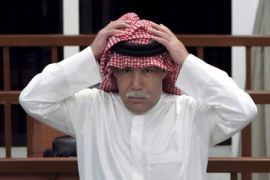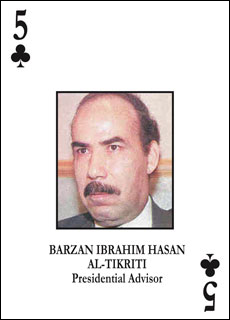Profile: Barzan Ibrahim al-Tikriti
Saddam’s half-brother and intelligence chief was implicated in murders and torture.

 |
|
Barzan al-Tikriti was number 52 |
Barzan Ibrahim Hassan al-Tikriti was one of Saddam Hussein’s three half-brothers and a former chief of the feared Mukhabarat intelligence service.
He was number 52 on the most-wanted list issued by the United States military after the invasion of Iraq in 2003 and was the five of clubs in the pack of playing cards issued to troops. American forces captured him in his home town of Tikrit in April that year.
Born in 1951, al-Takriti was 18 years old when he took part in the 1968 coup that brought the Baath party to power.
When Saddam took control in 1979, he was given a prominent role in the intelligence service, later replacing Sa’dun Shakir, Saddam’s cousin, as its director.
While head of Iraqi intelligence, he was responsible for the repression of religious and ethnic minorities including forced deportation, disappearances and murder.
He was also responsible for ordering the assassinations of Iraqi dissidents carried out by Mukhabarat agents on foreign soil.
Al-Tikriti was sentenced to death for his role in the murder of 148 Shia inhabitants of the village of Dujail after an attempt on Saddam Hussein’s life in 1982, shortly after he had taken control of Mukhabarat.
Tied up and kicked
During the trial one woman testified that after her arrest she was stripped naked and tied up by her feet before the intelligence chief kicked her in the chest repeatedly.
Ahmed Hassan, another prosecution witness, described being taken to an interrogation facility in Baghdad and seeing a meat grinder for human flesh.
| “Barzan was present [in Dujail]. He had red cowboy boots and blue jeans and a sniper rifle.” |
After the assassination attempt, Barzan was said to have roamed around the village with a sniper rifle firing indiscriminately.
“Barzan was present. He had red cowboy boots and blue jeans and a sniper rifle,” Hassan told the court.
In May 1983 he personally supervised the murder of at least six people from the al-Hakim family and ordered the arrest of 90 more family members.
Also that year he allegedly took charge of an operation to punish Iraqi Kurds suspected of aiding the Iranians. Witnesses claimed that under his direction, thousands of males aged between 14 and 70 from the Barzani tribe were arrested, held in camps near Irbil, northern Iraq, and then taken away.
According to one statement, up to 350 men were buried in a mass grave near Kirkuk after being shot, some by al-Tikriti himself. Several thousand people remain unaccounted for.
Al-Tikriti was hot-tempered and secretive and had a series of rows with members of Saddam’s clan including one that saw him pushed out of government between 1983 and 1988. But family ties meant that he was always welcomed back.
UN ambassador
In 1988 he was sent to Geneva as Iraq’s ambassador to the United Nations, an important role which reportedly allowed him to co-ordinate the secret purchase of parts for the weapons programmes and set up arrangements that helped Iraq to circumvent United Nations sanctions imposed after the invasion of Kuwait.
The position also provided the perfect cover for him to guide Baghdad’s intelligence network in Europe and manage Saddam’s assets in European banks, according to the government’s opponents.
He returned to Iraq in 1998 after his wife died of cancer and was accused by Saddam’s immediate family of plotting to overthrow the regime.
One source close to al-Tikriti told the AFP news agency that he had urged Saddam to disband the ruling Revolution Command Council and proposed forming a government of technocrats led by himself.
He was reportedly interrogated at length by Saddam’s younger son, Qusay, but by late 1999 relations seemed to have been repaired. On December 27 Saddam met his three half-brothers in public for the first time in two years to give them medals for bravery and merit.
During his trial al-Tikriti was diagnosed with spinal cancer but several appeals for his release on humanitarian grounds were dismissed.